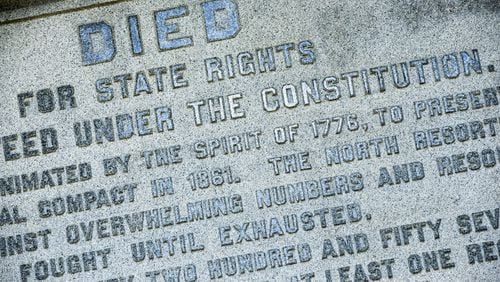In a clumsy effort to appeal to his dwindling base and justify his much-criticized comments about the recent tragedy in Charlottesville, Virginia, President Donald Trump has now weighed-in on the issue of preserving Confederate monuments. Given the president’s obvious political motives, along with his glaringly limited knowledge of history in general and the Civil War in particular*, his intervention in this discussion can only be toxic. His tweets and comments can only serve to promote controversy and division, rather than encourage local communities to have important discussions about their statues and monuments.
President Trump suggests that the “beautiful” (Confederate) monuments are part of our history and should be preserved. That is an argument many Southerners have made over the decades, but the more this writer has studied his own heritage, the less logical or reasonable this argument seems.
Make no mistake about it, I am a true Southerner by heritage. I recently discovered an application for a state of Georgia Civil War pension signed by my maternal great-grandfather. On the application he listed as his date and place of surrender April 9, 1865 at Appomattox Court House, Virginia.
I am proud of my great grandfather for his service in the Confederate army, not because I agree with the objectives of the Confederacy, but because he did his duty as he saw it and endured tremendous suffering, including being twice wounded. However, what makes me much more proud, is that this man of limited wealth (a small farmer in Gibson, Georgia) saw the importance of education and raised a son— my grandfather — who graduated from the Medical College of Georgia and became a respected country doctor.
It is now 150 years since my great grandfather and his commander, Gen. Robert E. Lee, surrendered. While I partially understand why monuments to Civil War leaders such as Lee were built in the late 19th and early 20th centuries, when veterans like my great grandfather were still alive, I have long been puzzled as to why Georgia and other states of the former Confederacy are so protective of monuments, statues, flags and other reminders of the worst four years of our history-- and our greatest moral failing.
One would think that Georgians would want to memorialize the leaders and accomplishments of our state during times of its greatest successes.
My mother’s family has been in Georgia for nine generations, dating back to 1738, just a few years after Oglethorpe established the colony. In addition to my great grandfather’s service in the Civil War, one of our relatives fought in the Revolutionary War (with the rebels, of course) and other generations were good, simple people who worked hard to pursue happiness and improve the lives of their children.
Given the nearly 300-year history of both my state and family, it baffles me why people in the 21st century are still attached to statues, flags and other symbols of a disastrous war that left the state and its people defeated, devastated, and impoverished. It makes one wonder why preserving these monuments is so important — especially when they are so hurtful to so many of our fellow citizens.
There are probably hundreds of Civil War statues and monuments throughout the states of the old Confederacy, and they very likely symbolize something different to each member of each community. President Trump believes they are “beautiful” and important reminders of our history, but the president needs to butt out of this discussion and let the people and governments in each community democratically and peacefully determine what these memorials of another era mean to their communities today.
Thomas Jefferson said that a little revolution every 20 years or so might be a good thing. Perhaps a little revolution of thought and symbolism every century or so can be a good thing, too.
*(In recent months Trump has implied that Andrew Jackson was alive during the Civil War and that Frederick Douglass is still with us. "He has done an amazing job and is being recognized more and more.")
Lee Raudonis is a resident of Big Canoe and a ninth-generation Georgian. He has been a Republican political operative in both Georgia and the U.S. Congress.






